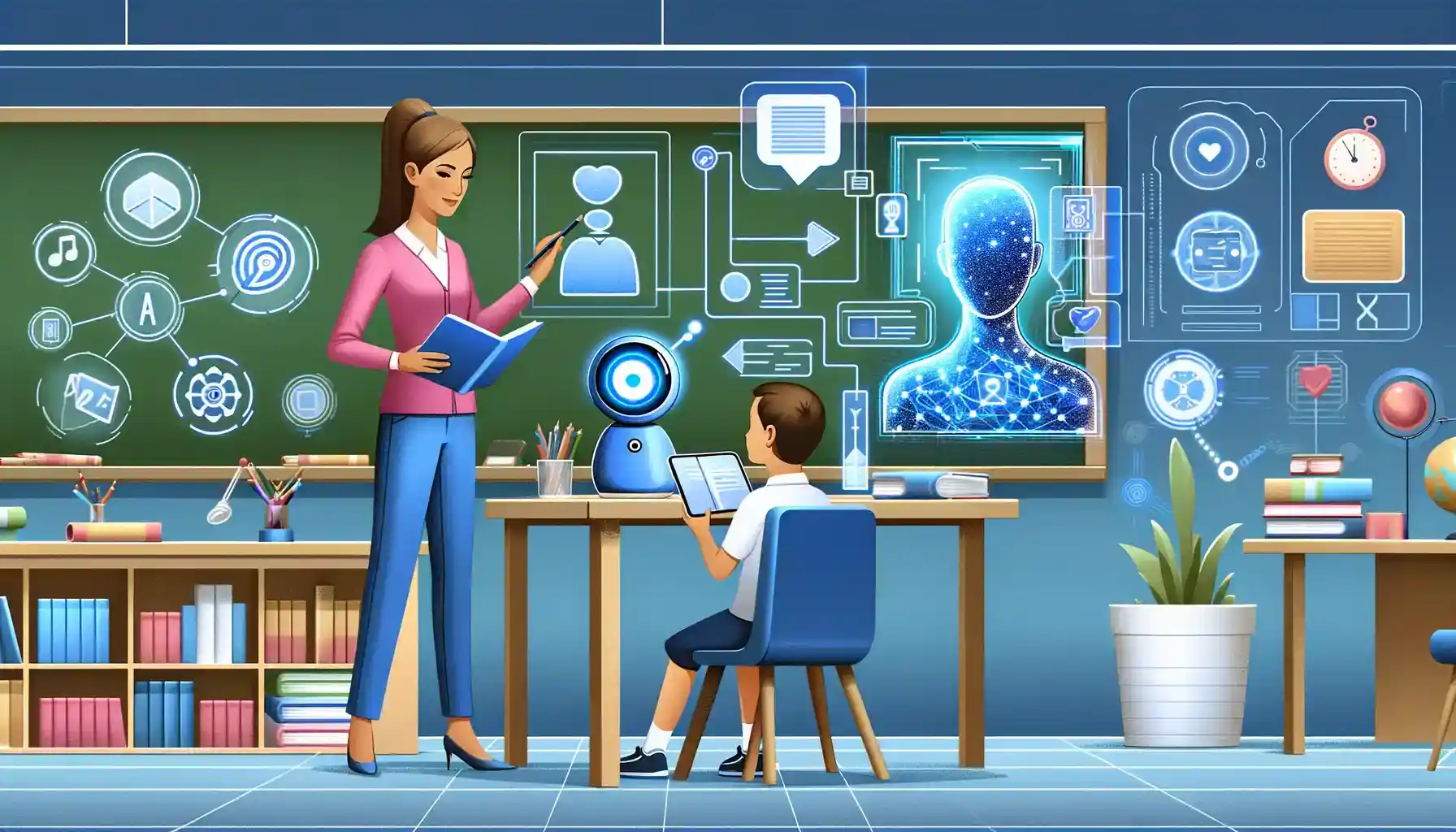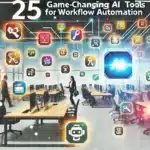Today’s workers face a new reality: while AI might not take over jobs entirely, those with AI skills are rapidly outpacing those without. As the future workforce needs to be AI-ready, the question arises: how will this impact education and learning? More importantly, how is the increasing use and adoption of AI affecting today’s teachers and students?
The education ecosystem is already undergoing profound and disruptive changes, with AI providing new tools for educators, administrators, and students. AI empowers students to explore deeper into subjects, aids educators in tailoring learning experiences, and supports administrators in streamlining operations.
AI-Enabled Learning: Self-Directed, Self-Paced, and Self-Empowering
Sal Khan, the visionary behind Khan Academy, highlights in his book “Brave New Words: How AI Will Revolutionize Education (and Why That’s a Good Thing)” that AI will democratize education. He envisions a future where AI enables lifelong learning by granting everyone access to educational resources on any topic. AI assistants will guide both students and educators, offering explanations tailored to each individual’s understanding level.
Hyperpersonalized Education
Research firm Cognilytica introduces the concept of “Hyperpersonalized education,” which ensures continuous learning from early childhood to professional development. AI-powered systems can deliver customized, relevant content, shifting away from the one-size-fits-all model of traditional education. This approach is already evident as people increasingly turn to Large Language Model (LLM) systems for precise and context-appropriate responses, moving away from the cluttered results of conventional web searches.
AI Challenges for Learning Institutions
Educational institutions from K-12 to higher education face both opportunities and challenges with AI’s expansion. With hyperpersonalized education, the traditional methods of teaching and learning must evolve. Educators need to ensure that students not only retain information but also develop critical life skills and apply their knowledge in a future dominated by AI.
Embracing AI in Education
Many institutions have initially attempted to ban AI, but this approach is unsustainable. AI capabilities are embedded in everyday devices and applications, making bans impractical. Instead, educators must embrace AI, using it to create tailored educational content, engage students deeply, and ensure they master AI skills. Just as the Internet and web enhanced learning, AI will revolutionize education.
The Resurgence of Soft Skills
As AI systems demand human-like capabilities, soft skills such as creativity, critical thinking, collaboration, and communication are becoming increasingly valuable. These skills, sidelined in favor of technical disciplines, are now essential for maximizing the benefits of AI. AI assists with hard skills, making the integration of soft skills crucial for effective AI use.
The Changing Landscape of Higher Education
The rise of AI in education comes at a critical time for higher education. The value of expensive degrees is being questioned, especially with the changing workplace dynamics and accessible education alternatives. AI is poised to accelerate these changes, reshaping the value and approach to higher education.
AI’s Role in Personalized Learning
AI’s ability to provide personalized learning experiences is perhaps its most significant impact on education. By analyzing data on student performance, AI can identify strengths and weaknesses, tailoring lessons to meet individual needs. This approach not only enhances learning outcomes but also keeps students engaged and motivated.
Adaptive Learning Technologies
Adaptive learning technologies use AI to adjust the difficulty of tasks based on student performance in real-time. These technologies ensure that students are neither bored nor overwhelmed, maintaining an optimal learning pace. Platforms like DreamBox and Smart Sparrow are leading the way in adaptive learning, providing customized educational experiences that cater to each student’s unique learning style.
Enhancing Teacher-Student Interactions
AI tools are also transforming the interactions between teachers and students. AI can handle administrative tasks, such as grading and attendance, freeing up teachers to focus on more meaningful interactions with students. AI-powered chatbots can provide instant feedback and support, ensuring students receive help when they need it.
Virtual Teaching Assistants
Virtual teaching assistants like IBM’s Watson Tutor can answer student queries, provide additional resources, and even monitor student progress. These AI tools act as a supplement to traditional teaching methods, allowing teachers to dedicate more time to personalized instruction and student engagement.
Preparing Students for an AI-Driven Future
As AI becomes increasingly integrated into various industries, it is essential to prepare students for an AI-driven future. This preparation involves not only teaching AI-related skills but also fostering an understanding of how to work alongside AI systems.
Integrating AI into Curricula
Integrating AI into school curricula is crucial for preparing students for future careers. Courses on machine learning, data analysis, and coding can provide students with the foundational skills needed to thrive in an AI-dominated job market. Additionally, teaching ethical considerations and the societal impact of AI ensures that students can critically engage with AI technologies.
Ethical Considerations in AI Education
The integration of AI in education also raises important ethical considerations. Issues such as data privacy, algorithmic bias, and the digital divide must be addressed to ensure that AI benefits all students equitably.
Data Privacy and Security
With AI systems collecting vast amounts of data on student performance, ensuring data privacy and security is paramount. Educational institutions must implement robust data protection measures and be transparent about how data is used.
Addressing Algorithmic Bias
Algorithmic bias in AI systems can perpetuate existing inequalities in education. Ensuring that AI systems are fair and unbiased requires ongoing monitoring and adjustment. Diverse datasets and inclusive algorithm development practices can help mitigate bias and promote equity.
The Role of Educators in an AI-Enhanced Learning Environment
Educators play a crucial role in navigating the AI-enhanced learning environment. Their expertise and guidance are essential in leveraging AI tools effectively and ethically.
Professional Development for Educators
To maximize the benefits of AI in education, educators need ongoing professional development. Training programs on AI tools and their applications in the classroom can empower teachers to use these technologies confidently. Additionally, fostering a collaborative environment where educators can share best practices and learn from each other is vital.
FAQs
Q1: How is AI changing the role of teachers?
A: AI is automating administrative tasks, allowing teachers to focus on personalized instruction and student engagement. AI tools also provide instant feedback and additional resources to support student learning.
Q2: What is hyperpersonalized education?
A: Hyperpersonalized education uses AI to tailor learning experiences to individual student needs, preferences, and learning styles, ensuring a more effective and engaging educational experience.
Q3: How can AI help in lifelong learning?
A: AI enables lifelong learning by providing access to educational resources on any topic, at any time. AI assistants can guide learners through new material, offering explanations and insights tailored to their understanding level.
Q4: What are the ethical considerations in using AI in education?
A: Key ethical considerations include data privacy, algorithmic bias, and ensuring equitable access to AI tools. Addressing these issues is essential to maximize the benefits of AI in education.
Q5: How can educators prepare students for an AI-driven future?
A: Educators can prepare students by integrating AI-related skills into the curriculum, fostering an understanding of working alongside AI systems, and teaching ethical considerations related to AI technologies.
Q6: What is adaptive learning technology?
A: Adaptive learning technology uses AI to adjust the difficulty of tasks based on student performance in real-time, ensuring that students remain engaged and learn at an optimal pace.
By exploring these topics, educators, students, and policymakers can navigate the evolving landscape of AI in education, ensuring that the potential of AI is harnessed to create a brighter future for all learners.
Conclusion: Embracing AI for a Brighter Educational Future
AI is undeniably transforming education, offering personalized learning experiences, enhancing teacher-student interactions, and preparing students for an AI-driven future. While challenges such as data privacy and algorithmic bias must be addressed, the potential benefits of AI in education are immense. By embracing AI and integrating it thoughtfully into the educational ecosystem, we can create a more responsive, inclusive, and effective learning environment for all students.


